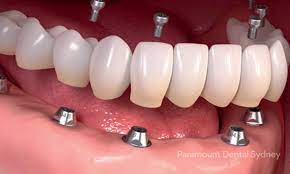Dental implants are artificial tooth roots typically made of titanium that are surgically implanted into the jawbone to provide a stable foundation for replacement teeth. These replacement teeth, which can be crowns, bridges, or dentures, are designed to mimic the appearance and function of natural teeth. Dental implants are used to restore missing teeth and can improve chewing ability, speech, and overall oral health. They are considered a long-term solution for tooth replacement and are often preferred over traditional dentures or bridges due to their durability and natural appearance.

Why Choose Dental Implants?
Dental implants offer several benefits:
- Improved Appearance: They blend seamlessly with your natural teeth, giving you a confident smile.
- Enhanced Funconality: Unlike dentures, implants allow you to eat and speak comfortably without worrying about slipping or discomfort.
- Long-lasting Solution: With proper care, dental implants can last a lifetime, making them a durable and cost-effective option.
- Preservation of Jabone: Implants stimulate bone growth and prevent bone loss, maintaining the structure of your face and jaw.
The Dental Implant Procedure
The dental implant process typically involves several steps:
- Consultation: Your dentist will assess your oral health and determine if you’re a suitable candidate for implants.
- Placement: The implant is surgically placed into your jawbone under local anesthesia. Over time, the bone fuses with the implant, anchoring it securely in place.
- Abutment Placement: Once the implant has bonded with the bone, an abutment (connector) is attached to it to support the replacement tooth.
- Placement of Replacement Tooth: Finally, a custom-made crown, bridge, or denture is attached to the abutment, completing your smile restoration.

Symptoms for Dental Implants
- Pain or Discomfort:
- Persistent or increasing pain around the implant site.
- Discomfort while chewing or biting down.
- Swelling and Inflammation:
- Swollen or tender gums around the implant area.
- Redness or inflammation of the surrounding gum tissue.
- Looseness or Mobility:
- Feeling of looseness or mobility in the implant-supported restoration.
- Noticeable movement of the implant or prosthetic tooth.
- Changes in Bite Alignment:
- Changes in the alinment of your bite, such as difficulty in closing your teeth properly.
- Uneven pressure distribution while chewing, causing discomfort or irritation.

Aftercare Tips
Taking care of your dental implants is essential for their long-term success:
- Maintain Good Oral Hygiene: Brush and floss regularly to keep your implants clean and prevent gum disease.
- Attend Regular Check-ups: Visit your dentist for routine check-ups and professional cleanings to ensure the health of your implants.
- Avoid Hard Foods: Steer clear of hard or sticky foods that could damage your implants or restorations.
- Quit Smoking: Smoking cinterfere with the healing process and increase the risk of implant failure, so consider quitting for better oral health.
Conclusion Dental implants offer a permanent solution for missing teeth, providing both aesthetic and functional benefits. By understanding the implant process and following proper aftercare, you can enjoy a confident smile and improved oral health for years to come. If you’re considering dental implants, consult with your dentist to see if they’re the right option for you.

